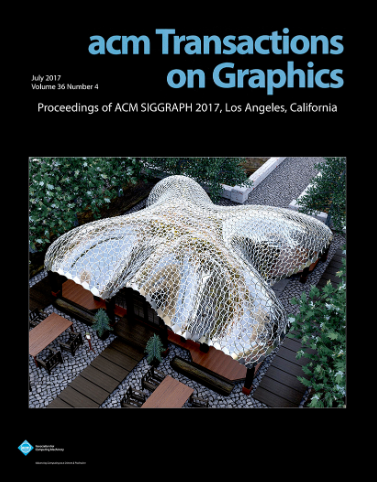3D Gaussian Ray Tracing: Fast Tracing of Particle Scenes
IF 9.5
1区 计算机科学
Q1 COMPUTER SCIENCE, SOFTWARE ENGINEERING
引用次数: 0
Abstract
Particle-based representations of radiance fields such as 3D Gaussian Splatting have found great success for reconstructing and re-rendering of complex scenes. Most existing methods render particles via rasterization, projecting them to screen space tiles for processing in a sorted order. This work instead considers ray tracing the particles, building a bounding volume hierarchy and casting a ray for each pixel using high-performance GPU ray tracing hardware. To efficiently handle large numbers of semi-transparent particles, we describe a specialized rendering algorithm which encapsulates particles with bounding meshes to leverage fast ray-triangle intersections, and shades batches of intersections in depth-order. The benefits of ray tracing are well-known in computer graphics: processing incoherent rays for secondary lighting effects such as shadows and reflections, rendering from highly-distorted cameras common in robotics, stochastically sampling rays, and more. With our renderer, this flexibility comes at little cost compared to rasterization. Experiments demonstrate the speed and accuracy of our approach, as well as several applications in computer graphics and vision. We further propose related improvements to the basic Gaussian representation, including a simple use of generalized kernel functions which significantly reduces particle hit counts.3D 高斯光线追踪:快速追踪粒子场景
基于粒子的辐射场表示法(如三维高斯溅射)在重建和重新渲染复杂场景方面取得了巨大成功。现有的大多数方法都是通过光栅化来渲染粒子,将粒子投射到屏幕空间的瓷砖上,按排序进行处理。而本作品则考虑对粒子进行光线追踪,利用高性能 GPU 光线追踪硬件建立边界体积层次结构,并为每个像素投射光线。为了高效处理大量半透明粒子,我们介绍了一种专门的渲染算法,该算法将粒子与边界网格封装在一起,以利用快速的光线三角形交点,并按深度顺序对交点批次进行阴影处理。光线追踪的优势在计算机图形学中众所周知:处理不连贯光线以获得二次光照效果(如阴影和反射)、从机器人技术中常见的高扭曲摄像头进行渲染、随机光线采样等。与光栅化相比,我们的渲染器只需付出很小的代价就能实现这种灵活性。实验证明了我们方法的速度和准确性,以及在计算机图形学和视觉领域的一些应用。我们进一步提出了对基本高斯表示法的相关改进,包括对广义核函数的简单使用,从而大大减少了粒子的撞击次数。
本文章由计算机程序翻译,如有差异,请以英文原文为准。
求助全文
约1分钟内获得全文
求助全文
来源期刊

ACM Transactions on Graphics
工程技术-计算机:软件工程
CiteScore
14.30
自引率
25.80%
发文量
193
审稿时长
12 months
期刊介绍:
ACM Transactions on Graphics (TOG) is a peer-reviewed scientific journal that aims to disseminate the latest findings of note in the field of computer graphics. It has been published since 1982 by the Association for Computing Machinery. Starting in 2003, all papers accepted for presentation at the annual SIGGRAPH conference are printed in a special summer issue of the journal.
 求助内容:
求助内容: 应助结果提醒方式:
应助结果提醒方式:


